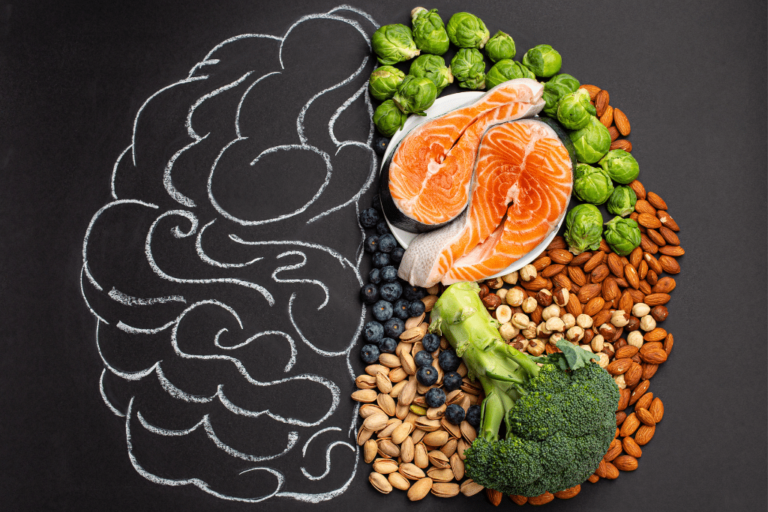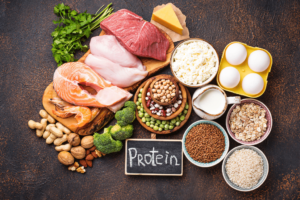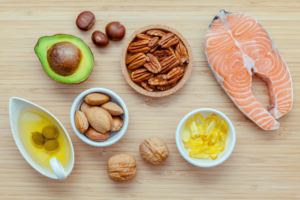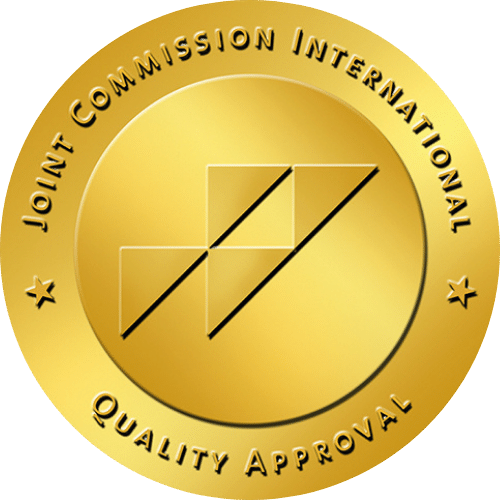4 min read
When recovering from a brain injury or aiming to boost cognitive health, the right nutrition plays an undeniable role in the process. The best food for brain recovery is packed with key nutrients that help promote healing, reduce inflammation, and support long-term brain function. In this article, we’ll explore the most effective foods for brain recovery and how you can incorporate them into your daily diet for optimal healing.

Why Nutrition Plays a Crucial Role in Brain Recovery
The brain is an incredibly complex organ that requires specific nutrients for proper repair and function. After an injury or during recovery, your brain needs essential vitamins, minerals, proteins, and healthy fats to rebuild damaged cells, maintain cognitive abilities, and reduce inflammation. Nutrition can either accelerate or hinder the recovery process, making it crucial to fuel your brain with the best possible foods.
Top Foods to Include in Your Brain Recovery Diet
Certain foods provide the perfect balance of nutrients that aid brain repair and enhance cognitive function. By including these brain-boosting foods in your diet, you can speed up recovery and support long-term mental health.
Protein: The Foundation of Brain Repair
Protein is critical for the repair of damaged brain tissue. It helps in the production of neurotransmitters, which are essential for communication between brain cells. The best sources of protein for brain recovery include lean meats, eggs, fish, and legumes. Aim for high-quality proteins that provide the amino acids necessary for neurotransmitter function and overall brain health.

Omega-3 Fatty Acids for Enhanced Brain Function
Omega-3 fatty acids, found in fatty fish like salmon, mackerel, and sardines, are among the best foods for brain recovery. These healthy fats not only reduce inflammation but also support the regeneration of neurons and improve overall cognitive function. Regular consumption of omega-3-rich foods can enhance memory, mood, and focus, making them essential for brain healing.

Antioxidants: Protecting Your Brain from Damage
Antioxidants protect the brain from oxidative stress, which can worsen brain injuries or slow down recovery. Foods rich in antioxidants, like blueberries, spinach, and dark chocolate, combat free radical damage and promote long-term brain health. These foods not only protect but also boost cognitive function by improving blood flow to the brain.

Healthy Fats: Essential for Brain Health
In addition to omega-3 fatty acids, other healthy fats are crucial for brain recovery. Avocados, nuts, seeds, and olive oil provide monounsaturated fats that improve brain function, support the structure of brain cells, and enhance overall memory and concentration. Including healthy fats in your meals is vital for reducing brain fog and maintaining focus during recovery.
The Role of Vegetables and Whole Grains in Brain Healing
Green leafy vegetables and whole grains are key components of a brain-healthy diet. Vegetables like kale, spinach, and broccoli are rich in folate and other nutrients that help regulate mood and cognitive function. Whole grains, such as brown rice, quinoa, and oats, provide a steady source of glucose for the brain, helping to maintain energy levels and support brain function without blood sugar spikes.
Hydration and Its Impact on Cognitive Recovery
Staying hydrated is essential for optimal brain recovery. Dehydration can impair cognitive function, slow down the healing process, and reduce concentration. Drinking plenty of water, herbal teas, and natural fluids like coconut water is crucial to keeping the brain hydrated. Aim to drink at least eight glasses of water per day to support both your physical and cognitive recovery.
Best Supplements to Complement Your Diet
While food should always be your primary source of nutrients, certain supplements can further enhance brain recovery. Consider fish oil supplements for additional omega-3 fatty acids or vitamin D for immune support. Additionally, magnesium can help relax the body and improve sleep quality, which is vital for healing. Supplements should never replace whole foods, but they can help fill in any nutritional gaps.
Creating a Balanced Meal Plan for Brain Recovery
A balanced diet rich in brain-boosting foods is essential for healing. Here’s an example of a simple, nutrient-dense meal plan:
- Breakfast: Scrambled eggs with spinach, avocado, and whole-grain toast
- Lunch: Grilled salmon with quinoa and a side of steamed broccoli
- Snack: A handful of mixed nuts and blueberries
- Dinner: Chicken stir-fry with colorful vegetables (peppers, carrots, broccoli) and brown rice
By consistently incorporating these nutrient-rich foods into your meals, you’ll be providing your brain with everything it needs to heal and function optimally.
Shopping List for Brain-Boosting Foods
To make it easier to stick to your brain-healthy diet, here’s a list of the best foods to support brain recovery:
- Protein:
- Chicken, turkey, and lean beef
- Eggs
- Fish (salmon, mackerel, sardines)
- Legumes (lentils, beans, chickpeas)
- Healthy Fats:
- Avocados
- Nuts (almonds, walnuts, cashews)
- Seeds (flaxseeds, chia seeds, pumpkin seeds)
- Olive oil
- Omega-3s:
- Fatty fish (salmon, mackerel, sardines)
- Walnuts
- Flaxseeds
- Antioxidants:
- Blueberries
- Dark chocolate (70% or more cocoa)
- Green leafy vegetables (spinach, kale, broccoli)
- Whole Grains:
- Brown rice
- Quinoa
- Oats
- Whole-grain bread and pasta
- Hydration:
- Water
- Herbal teas (chamomile, green tea)
- Coconut water
Conclusion
The best food for brain recovery is rich in essential proteins, healthy fats, omega-3 fatty acids, antioxidants, and whole grains. These nutrients support the healing process, reduce inflammation, and improve cognitive function. In addition, staying hydrated and considering supplements can enhance your recovery. By incorporating these foods into your diet, you’ll give your brain the nourishment it needs to heal faster and function at its best.
Frequently Asked Questions (FAQs)
What is the best food for brain recovery after a traumatic brain injury?
The best food for brain recovery includes high-protein foods like eggs, chicken, and fish, as well as omega-3 fatty acids found in salmon and mackerel. Additionally, foods rich in antioxidants, such as blueberries and dark chocolate, help reduce inflammation and protect brain cells. Healthy fats from avocados and nuts support brain cell structure and improve cognitive function. Incorporating whole grains, like brown rice and quinoa, provides a steady source of glucose for the brain, which is essential for energy and recovery. A balanced diet with these foods can significantly support the brain’s healing process.
How can I speed up brain recovery with diet?
To speed up brain recovery, focus on a diet that includes foods rich in protein, omega-3 fatty acids, antioxidants, and healthy fats. Protein repairs brain cells, while omega-3s reduce inflammation and support brain regeneration. Antioxidants protect the brain from oxidative stress, and healthy fats enhance memory and cognitive function. Additionally, staying hydrated with water and herbal teas is crucial for maintaining cognitive clarity. A balanced, nutrient-dense diet helps your brain heal faster and function better.
Can I improve my cognitive function with food?
Yes, certain foods can help improve cognitive function by boosting brain health. Omega-3 fatty acids, found in fatty fish, promote brain cell regeneration, while antioxidants from blueberries and green leafy vegetables help protect the brain from damage. Whole grains provide a consistent energy source for the brain, while healthy fats from nuts and olive oil enhance brain function and memory. A well-balanced diet with these brain-boosting foods supports mental clarity, focus, and overall cognitive health.
Is it important to drink water for brain recovery?
Yes, hydration plays a vital role in brain recovery. Dehydration can impair cognitive function, hinder healing, and affect concentration. Drinking enough water ensures that the brain functions optimally and supports the healing process. Aim for at least 8 glasses of water daily, and include other hydrating fluids like herbal teas and coconut water. Staying hydrated also helps maintain focus, mental clarity, and mood stability, all crucial for a speedy recovery.
What supplements should I take for brain recovery?
While food should be your primary source of nutrients, certain supplements can support brain recovery. Omega-3 supplements, such as fish oil, provide extra fatty acids that promote brain healing and function. Vitamin D supports the immune system, and magnesium can help improve sleep quality, which is crucial for healing. However, supplements should complement a nutrient-rich diet and not replace whole foods. Always consult with a healthcare provider before starting any new supplements to ensure they are safe for you.
